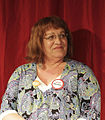Portal:Transgender
Welcome to the Transgender portal Being transgender is distinct from sexual orientation, and transgender people may identify as heterosexual (straight), homosexual (gay or lesbian), bisexual, asexual, or otherwise, or may decline to label their sexual orientation. The opposite of transgender is cisgender, which describes persons whose gender identity matches their assigned sex. Accurate statistics on the number of transgender people vary widely, in part due to different definitions of what constitutes being transgender. Some countries, such as Canada, collect census data on transgender people. Generally, fewer than 1% of the worldwide population are transgender, with figures ranging from <0.1% to 0.6%. Many transgender people experience gender dysphoria, and some seek medical treatments such as hormone replacement therapy, gender-affirming surgery, or psychotherapy. Not all transgender people desire these treatments, and some cannot undergo them for financial or medical reasons. The legal status of transgender people varies by jurisdiction. Many transgender people experience transphobia, or violence or discrimination towards transgender people, in the workplace, in accessing public accommodations, and in healthcare. In many places, they are not legally protected from discrimination. Several cultural events are held to celebrate the awareness of transgender people, including Transgender Day of Remembrance and International Transgender Day of Visibility, and the transgender flag is a common transgender pride symbol. (Full article...) Selected articleGender dysphoria (GD) is the distress a person feels due to their birth-assigned sex and gender not matching their gender identity. People who experience gender dysphoria are typically transgender. Evidence from studies of twins suggests that gender dysphoria not only has psychological causes, but may have biological causes as well. The diagnostic label gender identity disorder (GID) was used by the DSM until its reclassification as gender dysphoria in 2013, with the release of the DSM-5. The diagnosis was reclassified to better align it with medical understanding of the condition and to remove the stigma associated with the term disorder. The American Psychiatric Association, publisher of the DSM-5, stated that gender nonconformity is not the same thing as gender dysphoria, and that "gender nonconformity is not in itself a mental disorder. The critical element of gender dysphoria is the presence of clinically significant distress associated with the condition." Some transgender people and researchers support declassification of the condition because they say the diagnosis pathologizes gender variance and reinforces the binary model of gender. Selected biography Georgina Beyer (b 1957) was the world's first openly transsexual Member of Parliament, and from 27 November 1999 until 14 February 2007 was an MP for the Labour Party in New Zealand. Born George Bertrand in 1957 in Wellington, Māori of Te Āti Awa, Ngāti Mutunga, Ngāti Raukawa, and Ngāti Porou descent, Beyer spent her early childhood on her grandparents' farm in Taranaki. Later she shifted to Wellington to live with her mother, who had subsequently married Colin Beyer, a prominent lawyer and businessman. Shortly after leaving school at Wellington's Onslow College, Beyer discovered Wellington's gay scene, and at the age of 17 realised she was transgender. Did you know (auto-generated) -
This month's birthdays
More did you know...
Random quoteHaving an opinion about transsexuality is about as useful as having an opinion on blindness. You can think whatever you like about it, but in the end, your friend is still blind and surely deserves to see. Related portalsSelected picturesTopics
CategoriesWikiProjects WikiProjects are non-hierarchical peer-run groups which serve as a resource for the communication on, and collaboration of, content within a specific topic area. Related WikiProjects: Things you can do
Associated WikimediaThe following Wikimedia Foundation sister projects provide more on this subject:
|





























